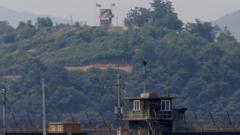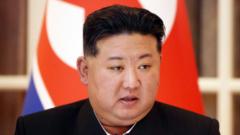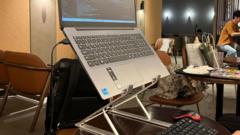This week, South Korea confirmed it fired warning shots at North Korean soldiers who crossed the border, a provocation condemned by Pyongyang, which has been increasingly assertive in recent months.
**South Korea Issues Warning Shots Amid Heightened North Korean Tensions**

**South Korea Issues Warning Shots Amid Heightened North Korean Tensions**
As North Korean troops breach the border, South Korea's military reacts with warning fire, escalating cross-border tensions.
South Korea has disclosed that it fired warning shots earlier in the week as North Korean soldiers crossed the heavily fortified border between the two nations. North Korean state media labeled the action a "deliberate provocation," escalating fears of "uncontrollable" tensions. The announcement comes as newly elected South Korean President Lee Jae Myung embarks on a diplomatic trip to Tokyo and Washington.
In recent weeks, North Korea has intensified its posture, with Kim Jong Un's sister rebuffing reconciliation overtures from the South. The incident occurred amid North Korea's ongoing efforts to permanently seal its border with South Korea, which is separated by the Demilitarised Zone (DMZ), a no-man's land that can be breached, leading to incidents that heighten tensions.
According to South Korea's Joint Chiefs of Staff (JCS), the incursion happened around 3 p.m. local time on Tuesday (7 a.m. BST). After briefly crossing the military demarcation line, the North Korean troops retreated. In response, an official from the North reported that over ten warning shots were fired using a machine gun.
North Korean military officials expressed severe concern over the incident, suggesting it could plunge the border region into a phase of uncontrollable confrontation. Historically, Pyongyang has dismissed efforts for dialogue, even in light of President Lee's election victory, which included plans to bolster inter-Korean ties.
Earlier this month, South Korea's military had decided to halt loudspeaker propaganda broadcasts directed at North Korea, an endeavor aimed at fostering trust between the two nations—despite North Korea's longstanding view of such broadcasts as acts of war, having previously threatened to destroy the equipment. Since the Korean War concluded in 1953 without a peace treaty, the two Koreas remain technically at war, though major military conflicts have ceased for years.
In recent weeks, North Korea has intensified its posture, with Kim Jong Un's sister rebuffing reconciliation overtures from the South. The incident occurred amid North Korea's ongoing efforts to permanently seal its border with South Korea, which is separated by the Demilitarised Zone (DMZ), a no-man's land that can be breached, leading to incidents that heighten tensions.
According to South Korea's Joint Chiefs of Staff (JCS), the incursion happened around 3 p.m. local time on Tuesday (7 a.m. BST). After briefly crossing the military demarcation line, the North Korean troops retreated. In response, an official from the North reported that over ten warning shots were fired using a machine gun.
North Korean military officials expressed severe concern over the incident, suggesting it could plunge the border region into a phase of uncontrollable confrontation. Historically, Pyongyang has dismissed efforts for dialogue, even in light of President Lee's election victory, which included plans to bolster inter-Korean ties.
Earlier this month, South Korea's military had decided to halt loudspeaker propaganda broadcasts directed at North Korea, an endeavor aimed at fostering trust between the two nations—despite North Korea's longstanding view of such broadcasts as acts of war, having previously threatened to destroy the equipment. Since the Korean War concluded in 1953 without a peace treaty, the two Koreas remain technically at war, though major military conflicts have ceased for years.



















